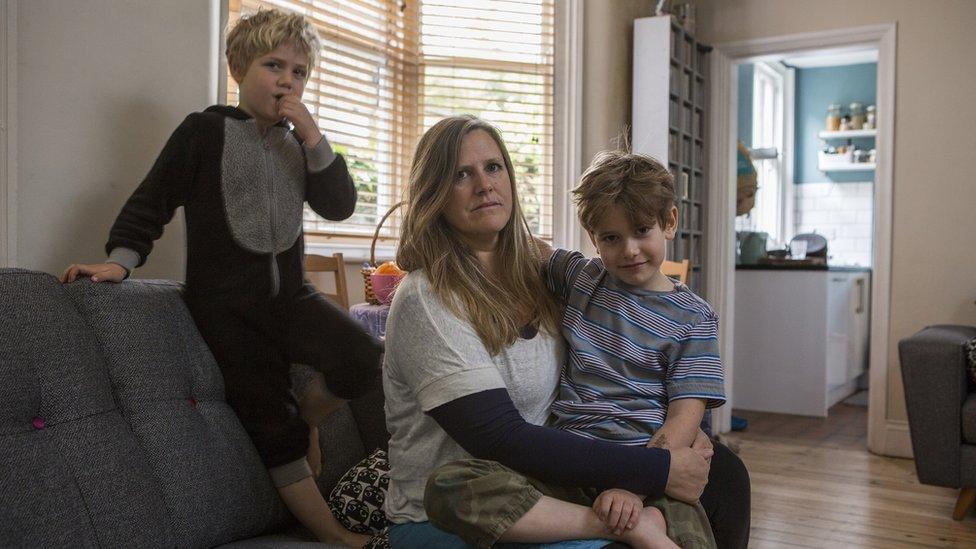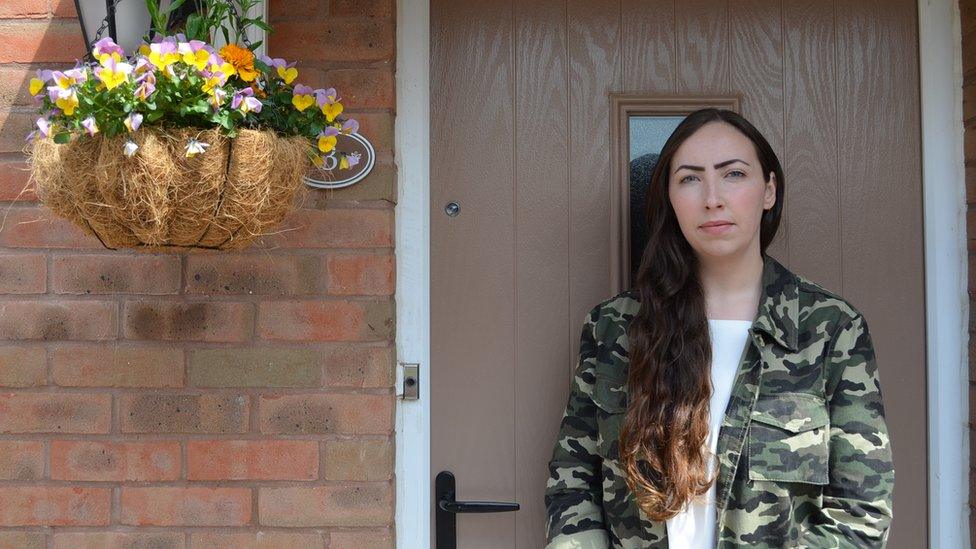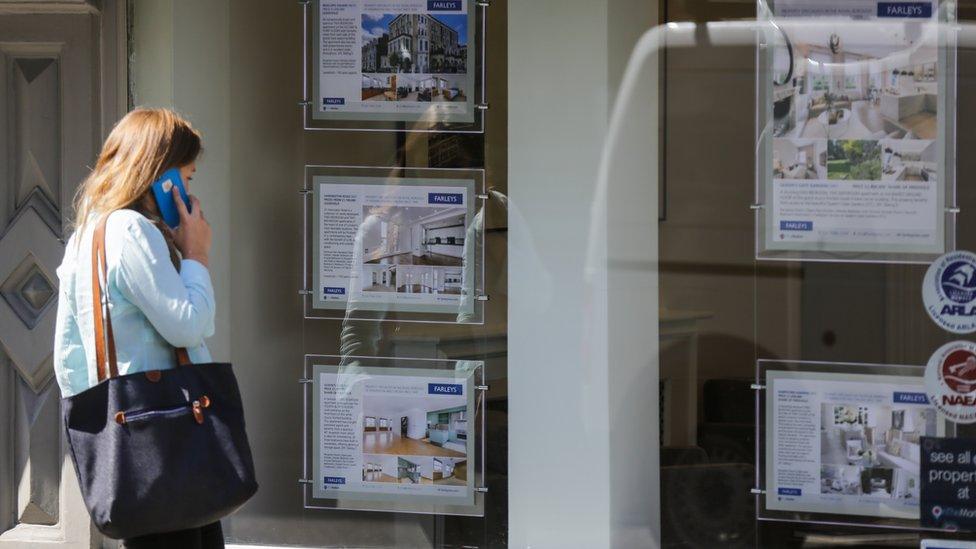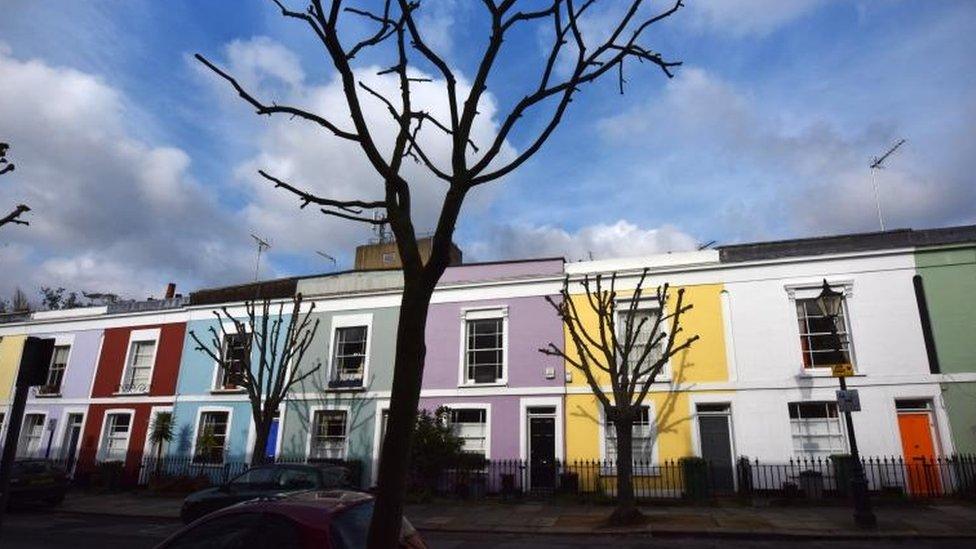Election 2017: What if I can't afford to pay the rent?
- Published

Longer leases would give tenants more security, says Tracy Strassburg
For Tracy Strassburg, a mother of two boys from Nunhead in south-east London, the sums just don't add up.
Her freelance job as a yoga teacher provides her with £640 a month.
Yet the rent on her small two-bedroom flat is £1,400. Even with housing benefit of £946 a month, she is still left borrowing £300 a month from her mother, as well as using credit cards.
"It's really stressful. A few days before rent day every month I start to go into a panic," she says.
According to the housing charity Shelter, there are now half a million people in the UK in the same situation: people who have jobs, but who still have to borrow money for the rent.
That amounts to one in three renters who are on low incomes, Shelter says.

Conservative promises

Increase security of tenure for "good tenants"
Encourage landlords to offer long tenancies as standard
Reduce rents by building 1.5m new homes by 2022
Promote more council houses, with Right-to-Buy after 10-15 years

But for Tracy and her family, the stress is not just because of the finances.
Since landlords sometimes want their property back, she has been forced to move repeatedly.
In his lifetime, her seven-year-old son has had six different homes, each more cramped than the last.
"Every time we move, we have to downgrade, because the rent goes up, and we have to move down," she says.
"So we started off in a perfectly acceptable-sized house, and we've gone slowly, slowly down into this tiny little place."
She wants the next government to introduce five-year leases to give tenants more security.

Labour promises

Rents can rise only with inflation
Three-year tenancies the norm
New standards to ensure homes are fit for habitation
Reinstate housing benefit for 18 to 21-year-olds
Build more council houses
Suspend Right-to-Buy policy

'£2.79 a week to live on'
In two years' time, new rules on housing benefit come into effect for social tenants that will make things even harder.
New claimants who are single and under 35 will only qualify for the shared accommodation rate (SAR) of housing benefit. In other words it is assumed they will live in a shared house or flat.
This rule already exists for private renters.
As a result, according to a new study by Sheffield Hallam University, external, some 12,500 young tenants in south-east England will see a shortfall between their benefit payments and their rent, typically of £55 a week.
Those under 25 claiming Jobseeker's Allowance (JSA) would be left with just £2.79 a week to live on, it claims.
But the government has said the change is necessary, as part of attempts to reduce the £25bn a year spent on housing benefit. And it has pointed out that councils do have the power to make discretionary payments in cases of hardship.
None of the parties has committed to reversing this policy.

Liberal Democrat promises

Rent rises to be inflation-linked
Cap for upfront deposits
Rent-to-own model, giving tenants ownership after 30 years
Tenants get first refusal to buy property when landlord sells
New loans to help first-time renters under 30 with a deposit
Reverse cuts to housing benefit


Lindy Hamilton worries that the new SAR plan will result in people becoming homeless
Thirty-year-old Lindy Hamilton, a travel and lifestyle blogger who lives in Swindon, is worried about the new shared accommodation rates.
If her income were to drop, she says she could suffer a disproportionate cut in housing benefit of around £40 a week.
"I would really struggle to be able to stay in my home," she says.
"This would create a monthly deficit of £160 in rent which, if I couldn't cover it, would result in me losing my home and being made homeless."
She would like the next government to tackle rising rents, and unscrupulous landlords who rent out properties that are not safe.
"I would also like them to take another look at the shared accommodation rate plan which is undoubtedly going to result in people getting into rent arrears and even becoming homeless."
The Sovereign Housing Association, which commissioned the Sheffield research, says it may have to consider subsidising rents for those under the age of 35, or else stop housing people in the younger age group altogether.

SNP promises

Likely to promise reintroduction of housing benefit for 18 to 21-year-olds
The Private Tenancies Bill, passed last year, already provides increased security for tenants
Rents can already only be increased once a year, and with three months' notice
Letting agency fees already outlawed
The full SNP manifesto will be published on Tuesday.
Update: This article has been revised after it transpired that one of the interviewees offered to the BBC had links with a political party.
- Published5 February 2017

- Published8 February 2017
